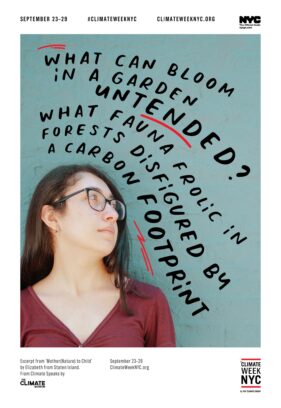Being Jewish
Elevating Unheard Voices
Editor’s Note: This essay was the winning entry in Hadassah Magazine’s first teen writing contest, which asked girls: How does my Jewishness impact my work for social and racial justice?” The contest was co-sponsored by Hadassah Magazine and jGirls Magazine.
As the acclaimed Jewish author and Holocaust survivor Elie Wiesel eloquently put it, the threads of our humanity unravel not when we destroy but when we do nothing: “The opposite of love is not hate, it’s indifference.” In other words, we are all intertwined in our existence, in our struggles and in our hopes and dreams for the future, not in spite of our identity, but because of it.
For this reason, I view activism—or, in my case, “artivism” through creative writing, especially spoken word poetry—as a fire that courses through my Jewish roots. It guides the hand that lights the menorah every year on Hanukkah to also proudly wave rally signs emblazoned with messages like “You’ll die of old age, we’ll die of climate change” or “This pussy grabs back.”
Ever since I was a young child, I’ve learned that compassion in the face of adversity and shining a light into the darkest crevices are as Jewish as fasting to cleanse your soul on Yom Kippur—or even ordering Chinese takeout on Christmas. Whether I perform mitzvahs directly inspired by the Torah, such as donating educational and financial resources to underserved communities, or partake in more secular actions like calling out rampant discrimination and police brutality through posterboard, I know that as a member of Generation Z and the Jewish faith, there is no better way to tackle inequity than by raising one’s voice.

I am—and will continue to be—an advocate for the causes I’m passionate about through art, a medium for connection and empathy unlike any other. Through my poetry, I follow the Jewish principle of elevating unheard voices by personifying the Earth as the world’s mother. Last year, I performed my poem “Mother(Nature) to Child” at the Apollo Theater in Harlem as a finalist in Climate Speaks, a spoken word youth arts program presented by The Climate Museum in Manhattan. I also advocate for educational equity through Bridge to Literacy, a nonprofit I co-founded that digitally teaches English to children from underserved communities in Honduras, Kenya, Ukraine and elsewhere.
However, as self-explanatory as actively fighting for social and racial equity may seem to me, there’s a cynical voice, perhaps from a still grieving generation who never got a chance to say goodbye to their own parents before they were murdered in Auschwitz, that asks: “Why?” Why should Jews extend their kindness and use every drop of their being to stitch the world back together, when it seems like God turned His back on our suffering? Why should we wipe off the blood from our noses, after eight days of anti-Semitic attacks in New York City last winter, and lift up other marginalized communities while the world barely blinks as an old man is bludgeoned on the subway simply for wearing a yarmulke?
It’s an uncomfortable truth that our people have known what it’s like to be ostracized, ridiculed and even killed for their identity—and that is precisely why it is our duty to ensure that no one, Jewish or otherwise, suffers the same fate. If we’re not united with other communities fighting for equality and acceptance, then we only sow the same seeds of division we Jews promised we’d uproot. We cannot forget that as our ancestors were forced behind barbed wire, their symbol of pride twisted into hastily sewn, star-shaped yellow badges, so, too, were other minorities—including gay people and Black people—imprisoned by the Nazis.
Unfortunately, the weeds of ignorance and hate don’t disappear easily. Under official Chinese policy today, for example, millions of the country’s mostly Muslim Uighur minority have been forced into detention centers, where, according to reports, they have been raped, beaten and forced to renounce their cultural and religious identity. Though the struggles of other groups shouldn’t undermine the Jewish one, we share more values and experiences than we probably realize—and through this, a desire borne of love: to build a brighter, uplifting and more equitable future.
Elizabeth Shvarts, a 16-year-old junior at Staten Island Technical High School, is a first-generation American of Russian Jewish origin.
READ MORE: Notable Selections in our Teen Writing Contest
Remembering My Family History Inspires My Work With Immigrants
Finding Passion In My Insular Jewish Enclave
Inspired by the Teachings of Elie Wiesel and Martin Luther King Jr.










 Facebook
Facebook Instagram
Instagram Twitter
Twitter
Susan Zelman says
What moving essays! I would like to organize a similar event in my community, possibly as an interfaith exercise to encourage our youth to examine their feelings on these issues, and then educate us grownups. Is it possible to send me the original request for essays? I am the 3rd generation of a 4-generation Hadassah Life Member Family, and past president of the Achot Young Leaders group of the Roslyn Chapter in Nassau County. I devour your magazine every month, especially in this year of challenges.